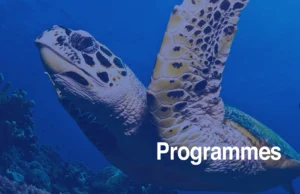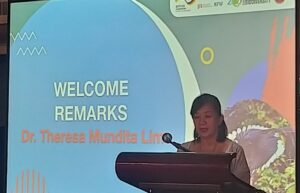“Charting a New Generation Partnership:The Philippines and the UN”
22 November 2023, 9:00 AM – 1:00 PM
Fairmont Makati, 1 Raffles Drive, Makati Avenue, Makati City
Hon. Secretary Enrique Manalo of the Department of Foreign Affairs;
Hon. Secretary Arsenio Balisacan of the National Economic and Development Authority;
Mr. Gustavo Gonzalez, UN Resident and Humanitarian Coordinator;
Distinguished guests, good morning!
It is well recognised that the vast biodiversity of the ASEAN region greatly contributes to its identity. It occupies only 3% of the planet’s surface, but it is home to 26% of all known plant and animal species.
While climate change may lead to the loss of these natural wealth, healthy species diversity and ecosystems also enhances nature’s ability to store and sequester carbon, and to act as our natural defence against the effects of the changing climate. A well-balanced ecosystem regulates climate and also reduces the risk of pandemics. Hence, both biodiversity loss and climate change are closely intertwined, and require equal attention and urgent actions.
In response to the challenge of biodiversity loss, the ASEAN Member States established the ASEAN Centre for Biodiversity in 2005— the only ASEAN centre hosted by the Philippines. The ACB has been a key partner of the UN Convention on Biological Diversity in facilitating capacity-building, technical and scientific cooperation, and advancing awareness about biodiversity. The Centre also works closely with the CBD Secretariat in facilitating discussions on ecosystem-based adaptation and on mainstreaming biodiversity in various sectors and across society, as well as in the development of national action plans for achieving global targets for protected areas and other area-based conservation measures.
It took hundreds of thousands of years for nature and ecosystems to evolve as we know them today. But we are now losing all these 1,000 times faster than they can naturally recover and replenish. Addressing the drivers of biodiversity loss require strong partnerships with sectors that rely or are strongly dependent, whether directly or indirectly, on nature, for sustainability and survival. It is therefore crucial to promote and build partnerships with various development sectors such as health, agriculture, fisheries, trade tourism, and infrastructure, among others.
A smart and effective partnership for biodiversity entails a whole-of-society approach. This includes all stakeholders from the government, indigenous peoples, local communities, private sector, and other stakeholders.
The Kunming-Montreal Global Biodiversity Framework adopted in December of 2022 under the UN CBD provides a blueprint from where transformative change can be achieved through collaborative action and partnerships.
Smart partnerships cover capacity-building opportunities, scientific and technical collaborations, technology transfer, knowledge sharing, and awareness raising across a wide range of stakeholders. It entails a deep understanding that investing in nature is vital and contributes to the sustainability of their business operations and outcomes.
More importantly, partnerships should be mutually beneficial, with complementary contributions that optimise available resources to achieve a common goal.
For ACB, our partnerships are always consistent with our mandate, mission, and vision, taking into account the needs and priorities of the ASEAN region, the post-2025 ASEAN vision, and the objectives of the CBD.
The ACB has longstanding partnerships with ASEAN’s dialogue and development partners, such as Germany, Japan, Norway, and the European Union, which have been generating best practices and worthwhile achievements that future collaborations can build on. The ACB also partners with institutions and organisations, such as the Global Wildlife Conservation, and the Pew Charitable Trusts; as well as with the private sector, including the Metro Pacific Investments Corporation (MPIC), and Google Arts & Culture, to name a few.
Effectively communicating the gains of these successful partnerships and cooperation increases its potential to be replicated and sustained. A smart partnership results in sustainable joint initiatives with greater and lasting impacts. The ACB provides a platform for knowledge and experience sharing on biodiversity conservation and sustainable use, within and beyond the region.
As the ACB continues its efforts to contribute to the attainment of all the UN goals for sustainable development through our work on biodiversity conservation and mainstreaming, we have been recognised as a reliable partner in implementing biodiversity-related programmes in the ASEAN.
In addition, the ACB advances its cooperation with the private sector as the current Chair of the Global Partnership for Business and Biodiversity, including promoting shared values and effective guardrails.
In September 2023, the ACB and the ASEAN Business Advisory Council partnered to establish the ASEAN Business and Biodiversity Initiative, a regional platform that will advance climate action agenda in ASEAN. The ABBI will actively contribute towards transitioning to a greener and sustainable future for ASEAN, by encouraging businesses in the region to adopt nature-based solutions to climate change and establish a regional carbon market.
Moving forward, we hope to capitalise on the momentum and the collaborations that are becoming available for the collective implementation of the KM GBF as well as to present opportunities to synergise efforts under the CBD, the UN Framework Convention of Climate Change, and other MEAs. 20//One upcoming partnership in alignment with the KM GBF is the Effectively Managing Networks of Marine Protected Areas in Large Marine Ecosystems in the ASEAN Region (ASEAN ENMAPS) project that the Centre will be implementing with the UNDP. Likewise, the Centre looks forward to implementing its partnership with the Amazon Cooperation Treaty Organisation and promote South-South cooperation in conserving biodiversity.
In addition, the ACB will continue to strengthen its engagement with the academia and research institutions to provide scientific and evidence-based information to aid policy and programme development. Towards this end, the ACB and Manila Observatory recently signed a partnership agreement to generate scientific data that will support decision-making on adopting nature-based solutions to climate change.
The recent study we conducted, together with Pew Charitable Trust on interconnectivity of marine ecosystems in the ASEAN region and adjacent areas, has given the impetus for the ACB to support work on establishing and recognising transboundary ASEAN Heritage Parks. Lastly, we prioritise the effective implementation of our CEPA strategy to further expand our network of conservation partners.
With all of these in the pipeline, we are confident that the ACB will complement work on the UN SDCF, as the ACB stands fully committed to working with its host country, the Philippines as well as its Southeast Asian neighbours to leverage their diverse natural wealth, and thus, collectively propel the entire region towards a more resilient and strong community where no one is left behind.
























